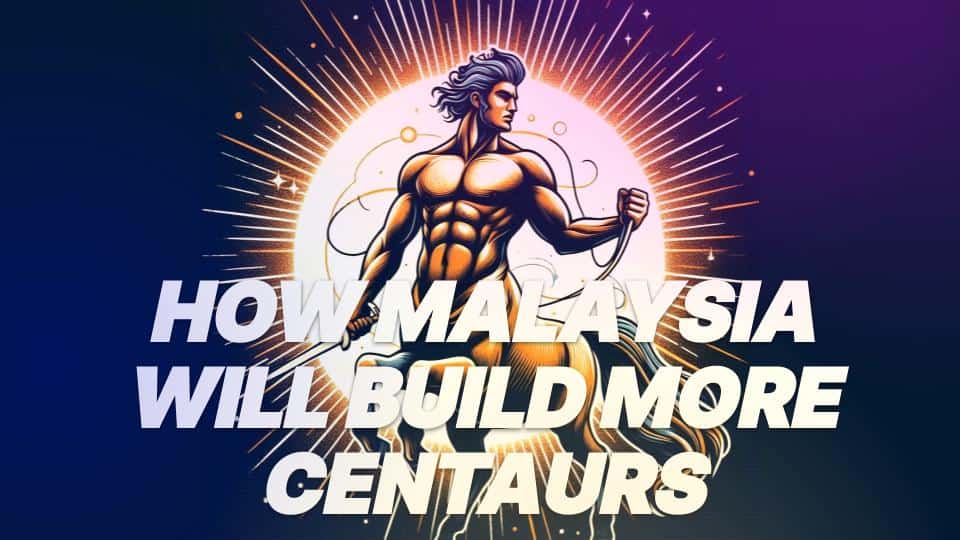Insights from Ben Lim at DisruptInvest Summit 2024
At the recent DisruptInvest Summit 2024, Ben Lim, CEO and Founder of NEXEA, delivered a compelling speech addressing the pressing questions surrounding Malaysia’s startup ecosystem. Here’s the full speech from Ben.
How Malaysia Will Build More Centaurs?

People around the Startup ecosystem in Malaysia often ask. Why aren’t there more unicorns being produced out of Malaysia? Why does it seem like there is not much funding for Malaysian Startups? Where are the big exits for Malaysian Startups? It seems as though Malaysia wants to create its own Silicon Valley success – to build lot’s of unicorns, attract huge foreign investments, and see lot’s of big Startup exits. Why is this unrealistic, and what is the Malaysian Startup Ecosystem destined for instead?
Hi, I am Ben Lim, CEO and Founder of NEXEA. I have spent the past 8 years building our community of 3500 summit attendees, and 100 tech entrepreneurs in our programme called Entrepreneurs Programme.
In our previous summit in October, Ben shared why 85% of unicorns are not real, and why Centaurs are the real unicorns. A centaur is a company that produces $100m USD in revenues – which is a better way of measuring these tech giants — and I know Centaurs exist because I actually caught a baby Centaur.
Today, I will share with you how Malaysia will build more Centaurs.
The Malaysian Startup Ecosystem
When we first started and we were learning about the Startup ecosystem here in Malaysia, there were a lot of people chasing unicorns. Entrepreneurs were trying to build their own. Big local & foreign investors dumped money into some of them. And even corporates and government were trying to build unicorns too. Hundreds of millions were poured into this experiment and basically everyone was in on it.
Remember! This was the height of Rocket Internet, and the SIlicon Valley fever that has come to Malaysia at that time. Lazada, Groupon, and Uber were huge disruptors here in Malaysia, and we still feel the mark they left here today. We saw a few huge Startups raise hundreds of millions, advertised huge on billboards, sponsored celebrities, and abruptly shut down or even do exits for pennies on the dollar. That experiment of building big and building fast to exit even faster has failed. We don’t hear of Groupon anymore. Uber is out, and although Grab took the market, they remain loss making today. Lazada and Shopee still find themselves having to subsidise shipping 12 years later today.
And today, the fact is that Silicon Valley isn’t that special anymore. Rocket Internet’s success is testament to that. Globally there are other markets catching up in the production of Unicorns, and an interesting fact is that San Fransisco has 21 Decacorns (which is 10-plus Billion USD valuation companies) while Silicon Valley has none according to CB Insights data.
But is this the right way to build unicorns? Heck, even Rocket Internet stopped building unicorns in the pump & dump style! Let’s Build Our Very Own Malaysian Startup Ecosystem, Not Another Silicon Valley
I think it was Sam Altman that said that ALL — ALL — of Y Combinators successes were Startups going after small markets that had very painful problems, and then, expanded afterwards. This resulted in very enthusiastic customers that gave them support for their growth later on. He was talking about Reddit, Dropbox and Stripe.
They gained huge momentum in revenues because they made something extremely valuable for their customers. Then, they just happened to have solved problems for markets that grew really big – that is where some luck comes in:
- Reddit’s market started really small. Only power users of the internet at that time used them.
- Dropbox’s initial market were people that wanted free online storage.
- Stripe’s first users were developers who found payments integrations complex and time-consuming.
Did you notice that none of them initially tried to build a unicorn as their main goal? They didn’t make money by “chasing money”. They didn’t make unicorns by “chasing unicorns”.
They were just passionate entrepreneurs solving problems for their most passionate customers at the start. And then they became Centaurs — not unicorns — because their business was built right. That is where strong fundamentals come in.
Startups often tell me. “Ben, it’s hard for us to get support. My friends and family do not understand what I am going through. I worry about paying salaries every month. I have a co founder quitting soon. I have issues hiring good people as a Startup. I can’t get enough revenues – my revenues are stagnating. I have issues collecting RM500,000 worth of invoices – my client is not paying me! Entrepreneurship is really hard. Where can I get support?”
The fact is that many entrepreneurs face very similar challenges across the board. Something that they face today, another entrepreneur has faced years ago – and vice versa.
Entrepreneurs have very few people to talk to about it simply because they are on the top of the command chain. Most entrepreneurs do not have the luxury to pass issues upwards to their directors or shareholders – certainly not operational issues. They can’t pass issues back downwards either – doing so can give employees the perception of incompetency – that stigma around vulnerability. Hence, the problems, the responsibilities and the decision-making get stuck with the entrepreneurs most of the time. All that financial stress. And this creates a void in their hearts. And that is why entrepreneurs are lonely. They are alone with their problems.
Now, imagine a world where we as Malaysians have an ecosystem that supports entrepreneurs extremely well. Imagine they are getting strong, relevant guidance by a strong community of even stronger entrepreneurs.
Instead of depression, they get a group of entrepreneurs to be their safety net. A strong network of entrepreneurs and mentors to be their guiding light in their darkest times. People who have been through what you as entrepreneurs are facing lately. They know the answers as they have solved the issue the hard way. They have paid their tuition fees and can now pass their entire playbook to you.
That is where our Entrepreneurs Programme comes in to help Startup entrepreneurs built companies with strong fundamentals.
—

Make no mistake. I am not saying we should not build unicorns. In fact I am saying we should have unicorns. I am saying to build unicorns, we should not do it how most people would think of building one – like buying revenues or incentivising temporary market demand, or even doing M&As for the sake of IPOs.
Let’s understand our weaknesses as a Startup ecosystem but also focus on our strengths instead. Rather than trying to produce unicorns, we should produce highly profitable Centaurs that will disrupt and innovate the Malaysian ecosystem.
Just like the mountain climbing injury survivor Joe Simpson did despite having one broken leg, stuck in a crevasse deep in the mountains, he managed to climb out by taking one step at a time. His climbing partner thought he was dead so there is no rescue mission either. Despite passing out a few times, his sheer determination brought him home.
We should not bet on getting a unicorn by buying revenues – that plan only works 0.01% of the time. We can only get unicorns by taking one step at a time. By building fundamentally strong startups. By making one right decision at a time. It will take a long time – but it will be worth it.
Build Startups right and have faith that funding will follow. Build Startups right and unicorns will emerge. Build Startups right and exits will come.
Build it right, so that Entrepreneurs, Investors, Corporate, and Government all win together.

